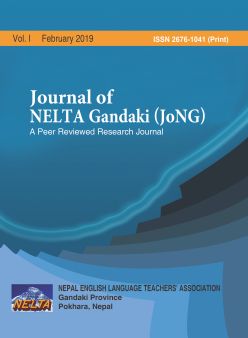Learning Strategies Employed in English Language: Perceptions and Practices
DOI:
https://doi.org/10.3126/jong.v1i0.24463Keywords:
cognitive, communicative, metacognitive, organization, rehearsalAbstract
Learning strategies are the key tools to determine the approach for achieving the learning goal. They are included in different phases of teaching learning process. They are usually tied to the needs and interests of students to enhance their learning efficiency. This article aims at exploring perspectives and practices of learning strategies in learning English language. For this, phenomenological descriptive qualitative research was conducted with a class of 48 students of Bachelor in Education at a constituent campus, under Tribhuvan University, Nepal. Both the class of the students and campus were selected purposively to meet the requirement of phenomenological study. Thirty classes were observed as a participant as well as teacher and from the same group of the students only ten students were interviewed. Then, the data from both the sources were triangulated, interpreted and analyzed descriptively. From this study, it was interpreted that students employed various strategies to learn different language skills and aspects. The study revealed that students felt difficulty in selecting proper learning strategy for learning grammatical rules due to many exceptional cases and listening skill due to their less time devotion on it while the felt ease to select and employ proper strategies in learning vocabulary.
Downloads
Downloads
Published
How to Cite
Issue
Section
License
This license allows reusers to distribute, remix, adapt, and build upon the material in any medium or format for noncommercial purposes only, and only so long as attribution is given to the creator.




